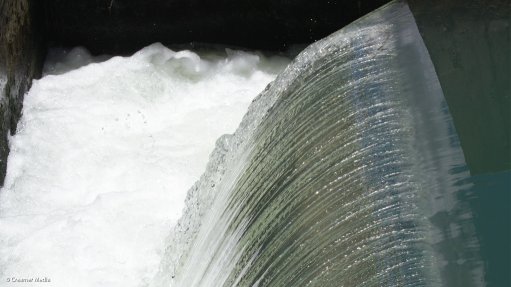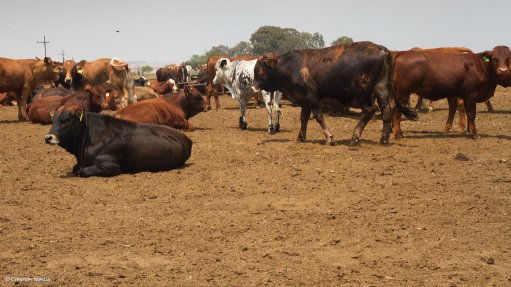Vesconite Bearings aims to improve energy efficiency, reduce carbon emissions

Vesconite Bearings CEO Dr Jean-Patrick Leger explains why low-friction bearing materials can be valuable in improving energy efficiency and reducing carbon emissions across the globe.
South African bearings manufacturer Vesconite Bearings believes that low-friction bearing materials can be valuable in improving energy efficiency and reducing carbon emissions across the globe.
Vesconite Bearings CEO Dr Jean-Patrick Leger says that between 1% to 5% of worldwide carbon emissions can be eliminated through careful and thorough efforts to improve energy efficiencies with low-friction plain bearings.
He highlights the company's ambitious Vision 2030 project, which outlines Vesconite Bearings’ commitment to making substantial contributions to the global reduction of carbon emissions by improving energy efficiency in many key industries responsible for considerable carbon emissions.
“Wear-resistant low-friction bearings are enablers for renewable energy production. Vesconite Bearings aims to support the development of new forms of renewable energy from waves, tides, sea currents, rivers, wind and geothermal energy sources,” Leger says.
He notes the various applications of Vesconite Bearings’ materials and how they play a pivotal role in eco-friendly initiatives across different industries.
“This includes an exciting project involving integrating sails onto container ships, where Vesconite Bearings’ materials contribute to improving efficiency, with the sails potentially reducing fuel consumption by 10% to 15%.
“Over the next six years, Vesconite Bearings’ Vision 2030 project will seek to improve energy efficiency in many key industries responsible for extensive carbon emissions. These include freight transport by road, rail and sea, the pumping of water and materials-handling tasks, which are all activities that are responsible for large carbon emissions,” he says.
Vesconite Bearings is actively involved in the hydroelectric industry and is supporting the development of wind, underwater, tidal, current and wave renewable power generators. Additionally, the company's products enhance the efficiency of pumps, contribute to smoother rail operations, and optimise truck suspensions, all contributing to a more sustainable and energy-efficient future.
“By providing more accurate suspension systems for heavy transport vehicles for example, Vesconite Bearings aims to reduce diesel consumption and tyre wear. In rail freight, low-friction products contribute to less energy required to pull trains, resulting in reduced wear on wheels and tracks, ultimately saving costs and energy,” he explains.
Economic Benefits
To increase awareness of Vesconite Bearings’ ability to decrease carbon emissions for industry, it plans to showcase success stories, such as the improvement in pump efficiency.
“Greater efficiencies not only lead to a reduction in emissions but also bring economic benefits through reduced energy consumption and lower energy bills,” Leger emphasises.
Meanwhile, Vesconite Bearings is actively investing in its own solar energy project, with a focus on powering its South African factory. A successful pilot plant was initiated five years ago and followed by a 750-kW solar plant, which exceeds the Virginia-based factory’s daytime energy needs. The company has also incorporated 1.84MWh of battery to address the challenges posed by power utility Eskom’s frequent loadshedding as well as unplanned power outages. Vesconite Bearings is ultimately aiming for long-term sustainable production processes.
Looking ahead, Leger envisions a future where Vesconite Bearings’ production runs solely on renewable power. He also sees opportunities for Vesconite products in solar systems, particularly for tracking solar panels.
“As the world continues to face environmental challenges, companies like Vesconite Bearings play a crucial role in shaping a greener, more sustainable future,” he concludes.
Article Enquiry
Email Article
Save Article
Feedback
To advertise email advertising@creamermedia.co.za or click here
Press Office
Announcements
What's On
Subscribe to improve your user experience...
Option 1 (equivalent of R125 a month):
Receive a weekly copy of Creamer Media's Engineering News & Mining Weekly magazine
(print copy for those in South Africa and e-magazine for those outside of South Africa)
Receive daily email newsletters
Access to full search results
Access archive of magazine back copies
Access to Projects in Progress
Access to ONE Research Report of your choice in PDF format
Option 2 (equivalent of R375 a month):
All benefits from Option 1
PLUS
Access to Creamer Media's Research Channel Africa for ALL Research Reports, in PDF format, on various industrial and mining sectors
including Electricity; Water; Energy Transition; Hydrogen; Roads, Rail and Ports; Coal; Gold; Platinum; Battery Metals; etc.
Already a subscriber?
Forgotten your password?
Receive weekly copy of Creamer Media's Engineering News & Mining Weekly magazine (print copy for those in South Africa and e-magazine for those outside of South Africa)
➕
Recieve daily email newsletters
➕
Access to full search results
➕
Access archive of magazine back copies
➕
Access to Projects in Progress
➕
Access to ONE Research Report of your choice in PDF format
RESEARCH CHANNEL AFRICA
R4500 (equivalent of R375 a month)
SUBSCRIBEAll benefits from Option 1
➕
Access to Creamer Media's Research Channel Africa for ALL Research Reports on various industrial and mining sectors, in PDF format, including on:
Electricity
➕
Water
➕
Energy Transition
➕
Hydrogen
➕
Roads, Rail and Ports
➕
Coal
➕
Gold
➕
Platinum
➕
Battery Metals
➕
etc.
Receive all benefits from Option 1 or Option 2 delivered to numerous people at your company
➕
Multiple User names and Passwords for simultaneous log-ins
➕
Intranet integration access to all in your organisation


















